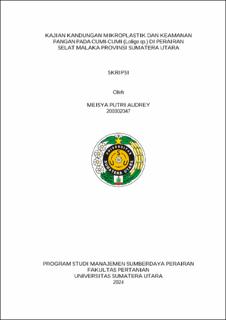Kajian Kandungan Mikroplastik dan Keamanan Pangan pada Cumi-Cumi (Loligo Sp.) di Perairan Selat Malaka Provinsi Sumatera Utara
Assessment of Microplastic Content and Food Safety on Squid (Loligo Sp.) in the Malacca Strait Waters of North Sumatra Province

Date
2024Author
Audrey, Meisya Putri
Advisor(s)
Dewinta, Astrid Fauzia
Metadata
Show full item recordAbstract
One of the pollutants that has a negative impact on marine biota is plastic waste disposal biota is plastic waste disposal. The eastern coastal region of North Sumatra produces waste generation of around 1,927,351.68 tons of waste which includes 60-70% organic waste and 30-40% inorganic waste. The composition of anorganic waste most is plastic waste at 13.9%. Microplastics are plastic particles whose diameter is less than 5 mm. Quality deterioration squid is also a threat to food safety. The long storage period long storage period before landing allows the emergence of microorganisms that cause quality deterioration. This study aims to determine the abundance and characteristics of microplastics, estimation of microplastic exposure, and chemical and microbiological quality of squid and microbiological quality of squid. This study was conducted from April 2024 to August 2024 which includes sampling, testing and analyzing samples in the laboratory and data analysis, the sampling location is in several fish landing sites along the waters of the Malacca Strait. The abundance of microplastics in squid (Loligo sp.) obtained in the tentacles was 67.48 particles / gram dry weight, and in the digestive tract was 42.46 particles / gram dry weight. Estimated microplastic exposure in the human body in consuming squid (Loligo sp.) is 6.53 ± 3.62 particles / year. Squid (Loligo sp.) landed at fish landing sites along the Malacca Strait of North Sumatra Province is negative for formaldehyde, the pH obtained is still in accordance with the quality standard of 6.6-7.3, and the Total Plate Count (TPC) value obtained at Gabion TPI and Tanjung Beringin TPI is still in accordance with SNI 2731.1-2010, while at Pantai Labu TPI is not in accordance with the established quality standard.
Collections
- Undergraduate Theses [817]
